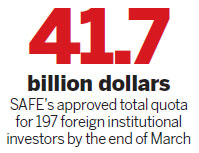Freer foreign capital flow vital for integration of A shares into global index
Updated: 2013-04-23 08:07
By Chen Jia (China Daily)
|
||||||||

Current quotas for overseas investors need to be raised, experts suggest
Industry experts have warned that integrating China's A-share market into the global investment index system is dependent on the freer flow of larger amounts of foreign capital in and out of the country.
Responding to Friday's announcement that the China Securities Regulatory Commission was in talks with international index compilers to join the global investment system, market watchers said it was vital that current investment quotas for its Qualified Foreign Institutional Investor, or QFII, and Renminbi Foreign Institutional Investor, or RQFII, schemes, be raised.
According to an official from the CSRC on Monday, the integration proposal is still at the discussion stage, and the main issues yet to be resolved focus on foreign exchange controls and possible fiscal taxation adjustments.
But Hong Hao, managing director and chief strategist at the BOCOM International Holdings Co Ltd, an investment banking and securities company in Hong Kong, was blunt in his assessment of whether global integration of the A-share system was possible.
"Before the authorities can sort out restrictions on cross-border capital flows and taxes on international funds, a multi-year endeavor, such index change remains a pipe dream," he told China Daily.
One of CSRC's potential cooperative targets is with MSCI Inc, the leading US provider of investment decision support tools to clients around the world, which is a public company listed on the New York Stock Exchange.
"If the MSCI index anchors China's A shares, over a trillion yuan ($161.7 billion) worth of fund could roll in the mainland stock market," said Hong.
MSCI has more than 7,500 clients, mostly global pension funds and boutique hedge funds, and the joining of Chinese mainland shares could attract large inflows of exchange traded funds, and bring liquidity to the market.
MSCI provides some emerging markets indices, including those involving China.
Those accounted for about 1 percent of its global equity trades when it launched in 1988, but that had increased to 13 percent by the end of 2012.
A source close to the Chinese capital market watchdog, who declined to be named, said that discussions between CSRC and the MSCI have been ongoing for a number of years, but that the biggest obstacle between the two sides reaching agreement had been "the closed capital account".
The only way to invest into the Chinese mainland stock market is to apply for a quota under the QFII scheme.
According to CSRC regulations, a single foreign institutional investor can hold a maximum of 10 percent of one public company's shares, and overseas investors can own a maximum 30 percent of the shares.
Other rules from the State Administration of Foreign Exchange require that the maximum quota for one QFII is $1 billion, and the total amount of money transferred outside every year can be no more than 20 percent of its year-end total assets in China.
Jiang Youheng, the chief strategist with Guotai Junan International Holdings Ltd, said MSCI would be a good way to provide services to large international funds and institutional shareholders, but added China "may need more time to completely open up its domestic stock investment system".
Zhao Xiaoyun, the chairman of Global Trend Investment Management Co Ltd, added: "In order to attract more international funds to buy A shares, QFII quotas and the series of investment limitations should be broken down."
By the end of March, the SAFE had an approved total quota of $41.7 billion for 197 foreign institutions. Last month, 11 QFIIs received quotas of $910 million.
The ceiling for QFII investment is $80 billion, expanded in April 2012 from $10 billion, when the scheme was launched in 2002.
Meanwhile, the approved RQFII quota was 70 billion yuan at the end of March.
The CSRC has added a further 200 billion yuan to the quota since November 2012, and there are plans to further expand the investment pool.
There have also been rumors in the market suggesting that the securities watchdog may start approvals of new RQFIIs this week.
The CSRC said it would welcome the injection of more long-term funds from overseas.
"It would be helpful to improve the investment structure and quality of the A-share market, and the influence would be significant," an official from the commission said.
chenjia1@chinadaily.com.cn
(China Daily 04/23/2013 page15)

 Obama celebrates young inventors at science fair
Obama celebrates young inventors at science fair
 Earth Day marked around the world
Earth Day marked around the world
 Volunteer team helping students find sense of normalcy
Volunteer team helping students find sense of normalcy
 Ethnic groups quick to join rescue efforts
Ethnic groups quick to join rescue efforts
 Earthquake leaves family shattered
Earthquake leaves family shattered
 Boston Marathon bombing suspect charged
Boston Marathon bombing suspect charged
 Chasing vestiges of the Great Wall
Chasing vestiges of the Great Wall
 Weekly Photos: April 15-21
Weekly Photos: April 15-21
Most Viewed
Editor's Picks

|

|

|

|

|

|
Today's Top News
Russia criticizes US reports on human rights
China 'aims to share its dream with world'
Chinese president appoints 5 new ambassadors
Nation's IPR suits see spike in 2012
H7N9 not spread between humans: WHO
Health new priority for quake zone
Sino-US shared interests emphasized
China, ROK criticize visits to shrine
US Weekly

|

|






